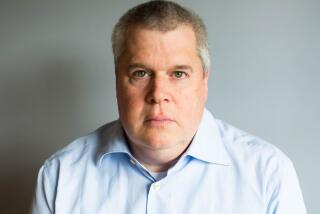BOOK REVIEW : Glorifying the Noble Gifts of Humankind
- Share via
ADAM AND EVE AND PINOCCHIO: ON BEING AND BECOMING HUMAN by Willard Gaylin, M . D. Viking $18.95, 268 pages
Would you risk the extinction of the chimpanzee in a promising medical experiment, asks Dr. Willard Gaylin in “Adam and Eve and Pinocchio,” in order to relieve the suffering and premature death of our own children?
Gaylin says yes, but points out that the answer to his intentionally provocative question is hardly to be taken for granted. A great many people are far more concerned about “animal rights” than, say, the prospect of saving human lives through medical experimentation. But Gaylin urges us to cherish “the glory of human existence” by reminding ourselves that we are, in the words of the Psalmist, “but little lower than the angels.”
Thus, Gaylin explicitly and emphatically rejects the “the accepted cultural wisdom of our day” that portrays humankind as nothing more than the highest stage of development in the animal kingdom. The “order of change between the chimpanzee and the human being is of such a magnitude as to represent a break, a discontinuity, in this great chain of life,” he insists. “Mankind is that noble discontinuity.”
“Adam and Eve and Pinocchio” is a civilized and civilizing discourse on what it means to be a human being in moral as well as biological terms. Gaylin plays out two extended metaphors in explaining “the extraordinary specialness” of humankind: Adam and Eve (“. . . existential drama of modern life is played out in metaphysical terms in the myth of the Garden of Eden”) and Pinocchio (“an ideal legend to . . . help draw the distinctions between having human form and ‘being human’ ”).
Gaylin, a psychiatrist and bioethicist, is alarmed at the decline in self-esteem of our whole species. “We don’t much like ourselves these days,” he writes. “We are a failure in our own eyes, and that is always a dangerous and unstable state, whether for the individual or the species. . . . We view ourselves as the polluters of the environment; the brutalizers of animals; the war-makers; the potential destroyers of the planet.”
But Gaylin insistently reminds us of humanity’s promise, its powers and its destiny: “ . . . the magnificent potential of the human being to be something halfway between animal and God.”
Starting with the fundamentals of Genesis and the Gospels (Gaylin reminds us that God created humankind “in His own image”) and gathering the threads of civilization (from Rabbi Akiba to Freud to Noam Chomsky, from Herodotus to Mary Shelley to Philip Roth) the author ponders the qualities that set us apart from animals. They include language and the ability to symbolize, freedom of will, the power of conscience and imagination and invention, the capacity to love and work, and the “extended repertoire of feelings that embellish the lives of human beings, and only human beings,” such as shame and guilt, wonder and delight, grief and anguish, awe and hope, love and hate.
Along the way, Gaylin sets himself up as a kind of freebooting social critic--or, to adopt the Biblical tone that permeates his book, a prophet. He pontificates on teen-age pregnancy, AIDS, genetic engineering, Oliver North, the ACLU and other miscellany. For example, Gaylin rejects what he perceives as the assault of society on free will and moral responsibility, two of the essential qualities of humankind: “Psychic determinism,” he observes, “is a mischievous concept in a society that aspires to justice.”
The message of Gaylin’s book is urgent but hopeful: “We have time--if precious little,” he writes, “time to mature; time to restore our perspectives; time to reorder our values; time to grow up and fulfill the promise of Genesis, the potential of our nature.”
“Adam and Eve and Pinocchio” is a bracing and ennobling book, a work of surpassing elegance in thought and language. Some readers will be unsettled by Gaylin’s insistence on seeing Godlike qualities in humankind; other readers, I suppose, will be challenged (or angered) by his self-confessed “bias” toward human beings.
But I came away from the book feeling refreshed, invigorated, inspired, as if the author had taken us by our collective shoulders and shouted, “Buck up!”
More to Read
The biggest entertainment stories
Get our big stories about Hollywood, film, television, music, arts, culture and more right in your inbox as soon as they publish.
You may occasionally receive promotional content from the Los Angeles Times.










